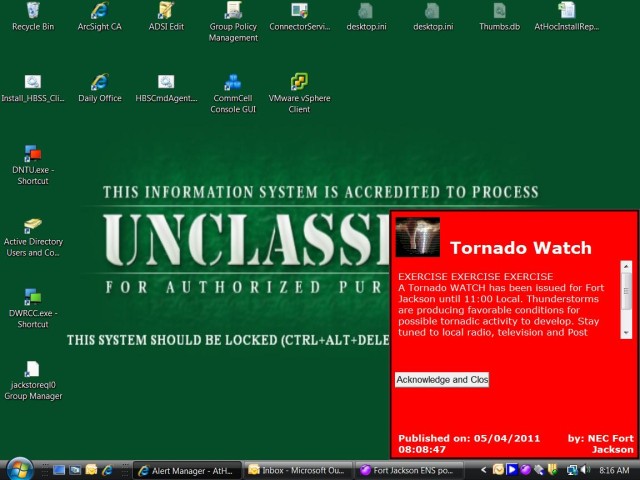FORT JACKSON, S.C. -- Just in time for the start of this year's hurricane season June 1, the Fort Jackson Emergency Operation Center is rolling out a new mass notification system to alert the community in case of impending disaster.
"What's so great about this new system is that it has the ability to reach far more people simultaneously in several ways," said Scottie Thomas, EOC chief. "For instance, we can send an email that has an intrusion pop-up. So if you're typing at your computer, regardless of what you're (doing), we are able from the EOC to send a message out, and it will intrude what you're typing on your computer."
In the past, commanders were alerted to emergencies and a phone tree was used to notify everyone else. This caused a delay in notifications, Thomas said. Now, a pop-up will alert computer users to the nature of the emergency, such as a tornado warning, and allow users to acknowledge the receipt of the message by clicking on a button.
The program that enables the system is installed remotely on Fort Jackson computers, and Thomas estimated that by next week, 90 percent of computer users will have access to the system. He emphasized that computer users don't have to sign up to receive messages. However, by clicking on a purple globe icon that will appear in the computer's system tray, users will be able to choose additional options, such as receiving text message alerts and voice alerts to home, office and cell phones.
Randy Barton, EOC operations officer, said the system's ability to incorporate different kinds of technology was one of the key factors in its selection.
"Text messaging is instantaneous. It is not hindered by a busy signal or a busy number, which often times can be the difference between disaster and safety in the emergency management business," Barton said. "That was very important, to have something that can walk step by step with these new technologies."
Another benefit of the system is its ability to include computer users who are not connected to the Fort Jackson network, such as people who work at Moncrief Army Community Hospital.
"It has the ability to not only alert all of the installation, but it has the ability to cross domains," Barton said. "That was really a big concern, because on an installation like Fort Jackson you have a little bit of everything - you have IMCOM, you have TRADOC, you have the hospital, you have the recruiting command, you have MEPS (Military Entrance Processing Station), you have DoD schools.
On a lot of installations, you have all these different networks. And the problem is, none of them are really compatible with the other. ... So we can reach these other agencies that we couldn't before."
Thomas said that plans are under way to make the system accessible to all of Fort Jackson's domains as well as making it available to family members. He said one of the goals is the installation of web-based kiosks, which could be used to sign up Soldiers and family members during in-processing.
"It's a possibility that I'd really like to see happen to make sure that everybody who wants to be warned has the opportunity," Barton said.


Social Sharing